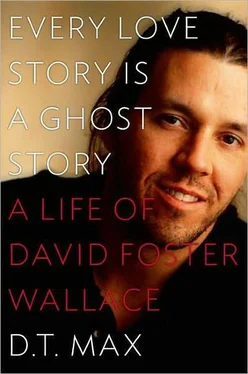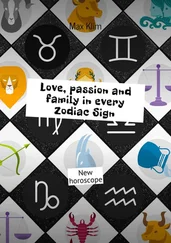Wallace had been exuberant in his praise of The Twenty-Seventh City . Now Franzen wrote Wallace after reading the galleys of Girl with Curious Hair to tell him that he thought he’d written half of a great book. He particularly loved, he wrote the author, “Here and There,” the story of the young man who begins by trying to reinvent literature and ends up failing to fix his uncle and aunt’s old stove; and he particularly hated “Westward,” which he felt provided none of the nourishment of good fiction. For him the heart of the story was the coda, the part with the David and L. — ’s relationship that climaxes in L. — ’s suicide-by-arrow:
By merely abstracting this story, aren’t you showing pretty much the opposite of what you’re telling? That you’re too impatient and too proud to do the stoop-work of creating character, suspense and emotional involvement? For something that’s “NOT metafiction,” the piece, as it stands, is awfully short on these commodities. I think it should have been mailed to Barth, not Norton.
Franzen felt he’d gone too far and crossed out the last line before he mailed it, but even so Wallace, opening the envelope at Yaddo, was stunned to read that Franzen had liked only “stories 1,2,6,7, and 8” in the collection, leaving out “Westward,” “Lyndon,” “John Billy,” and “Girl with Curious Hair” among others. Wallace had never been written to in this way before. “This Jonathan Franzen guy,” he wrote to Moore in mystification a month later, “keeps sending me these 15-page missives describing how I’ve violated every precept of ‘fiction as a moral exercise, an affirmation of life’.” His own favorites in the book were nearly the reverse of Franzen’s: only the Letterman story, the Jeopardy! story, “Lyndon,” “John Billy,” and of course “Westward” deserved to be in the collection. The other tales, he wrote Moore, had been part of the trade-offs he had had to make with Howard to get “Westward” into the book. “Here and There,” he wrote his new friend, was nothing but “sentimental pretentious pseudo-autobiographical crap.”
Yet he was happy to be attacked in this way; just beneath his self-confidence was always plenty of doubt, and the attention was flattering. He thanked Franzen for his critique, adding that he found his “extensively explained dislike for Westward fascinating.” It was “in its violence immensely gratifying.” He hoped they could meet in Boston soon to “drink or eat or whatever.” Franzen in turn suggested a Red Sox game. Wallace agreed to write a recommendation for his new friend’s Guggenheim Fellowship application. 26
Meanwhile, Wallace was facing the reality that few readers cared as much as Franzen about his attempt to remake literature. He hoped for a tour to go with the publication of Girl with Curious Hair , but there wasn’t much of one. He gave a reading at the Cambridge Public Library with a handful of people in attendance, including a schizophrenic woman who kept shrieking. He went down to New York and appeared with Vollmann at Dixon Place, a performance space. At the reading, Vollmann accompanied a story with a starter pistol shot into the air, Wallace covering his ears in pain. Afterward, he and Gerry Howard and a few others went to Café Pig, a restaurant on Houston Street. Howard was unsettled to see Wallace drink three bourbons “in dismayingly quick order” and then disappear downstairs into a bathroom for a half hour with a “proto-Goth girl with black lipstick”—Kathe Burkhart. He realized that the innocent boy in the U2 T-shirt was gone.
Girl could barely be found in bookstores, Wallace observing the increasingly unpromising situation. “The book is not yet out anywhere in New York or Boston,” he complained to Nadell in early November, “and apparently likewise in the Midwest. Curioser and curioser.” The nonreception of Girl was making its author more and more upset — after all, he had no new fiction with which to follow it. He saw the publication, he later told an interviewer, as “a kind of shrill jagged laugh from the universe. About, you know, I’m done, and now this thing , what was it like? This thing sort of lingers behind me like a really nasty fart.” He had risked a psychotic breakdown to create really serious work and hadn’t even gotten a review in the daily Times . He inscribed a copy to Rich C., praising the “pretty jacket” but adding, “This book is dying. You probably have the only copy in Tucson.”
Improbably, come September, the twenty-seven-year-old Wallace became a student again. The philosophy department at Harvard was located in Emerson Hall, a turn-of-the-century redbrick building in the Yard with a quotation from the Psalms inscribed on its façade. Wallace was among only six students admitted from hundreds of applicants. Nearly all had been graduate students in philosophy before. Yet within the department the students were considered beginners, neophytes. “There is no fathoming the subdoctoral mind,” was a phrase one professor liked to invoke, quoting the famous retired departmental head W. V. O. Quine.
As often happened with Wallace, the realization he’d made a mistake was nearly immediate. He went to a seminar taught by Stanley Cavell, a philosopher who held a special place in Wallace’s esteem. Cavell’s lively, learned, but friendly approach to philosophical investigations in books like Must We Mean What We Say? was the closest Wallace knew to his own; indeed Cavell may have been one of his literary models. But in person Cavell seemed to be talking only to himself and his initiates, who circled him like acolytes. Wallace, one student remembers, interrupted the professor and asked him to “make himself intelligible please,” a snarl on his face. Shortly afterward, he stopped going. 27
There were other problems. He took a first-year colloquium with John Rawls and found the reading, an anthology called Free Will , impossibly dense. He realized he was too old to go back to school; his classmates in the program seemed academic and sheltered to him. One time he went out with two of them to the Hong Kong, a Chinese restaurant near Harvard Square that specialized in heavily alcoholic drinks, and in the midst of a conversation between the two on semantic externalism, he interrupted to ask, “Have you ever tried LSD?”
His fellow students in turn regarded Wallace as a curiosity, a mystery, almost a primitive type, with his interest in porn and rap. One remembers thinking he’d gone back to school as “an anthropologist.” It was clear to most that he did not have the focus to keep up with the pitiless workload. He was still trying to finish his various freelance projects, and he looked tired and wrung out when he came to class. Gerry Howard visited Wallace around this time and found him in an apartment “messier than any I had been in since college.” He remembered philosophy and mathematics textbooks so abstruse he “could not even understand their titles,” and his author “shaky and unhappy.” Toward the end of Wallace’s brief stint at Harvard, one student came upon him fast asleep under one of the old wooden desks in the library on the second floor of the philosophy building.
Wallace wrote on the dedication page of the copy of Girl with Curious Hair he sent to Rich C. that he was “fucking up.” He added that he still attended two recovery meetings a week, but often hungover, and now had the shakes. 28Faced with the possibility that he would fail at the second of his chosen careers, the one his father had pursued so admirably, Wallace found his stunning energy collapsing in on itself again. It was, he later told an interviewer,
as though the entire, every axiom of your life turned out to be false, and there was actually nothing, and you were nothing, and it was all a delusion. And that you were better than everyone else because you saw that it was a delusion, and yet you were worse because you couldn’t function.
Читать дальше












